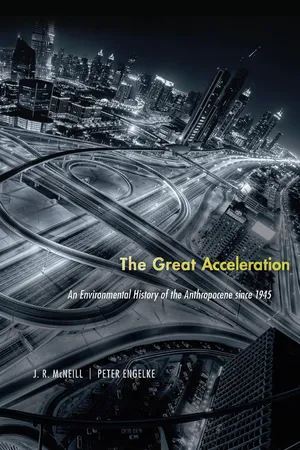
The Great Acceleration
An Environmental History of the Anthropocene since 1945
- English
- PDF
- Available on iOS & Android
The Great Acceleration
An Environmental History of the Anthropocene since 1945
About this book
The Earth has entered a new age—the Anthropocene—in which humans are the most powerful influence on global ecology. Since the mid-twentieth century, the accelerating pace of energy use, greenhouse gas emissions, and population growth has thrust the planet into a massive uncontrolled experiment. The Great Acceleration explains its causes and consequences, highlighting the role of energy systems, as well as trends in climate change, urbanization, and environmentalism.
More than any other factor, human dependence on fossil fuels inaugurated the Anthropocene. Before 1700, people used little in the way of fossil fuels, but over the next two hundred years coal became the most important energy source. When oil entered the picture, coal and oil soon accounted for seventy-five percent of human energy use. This allowed far more economic activity and produced a higher standard of living than people had ever known—but it created far more ecological disruption.
We are now living in the Anthropocene. The period from 1945 to the present represents the most anomalous period in the history of humanity's relationship with the biosphere. Three-quarters of the carbon dioxide humans have contributed to the atmosphere has accumulated since World War II ended, and the number of people on Earth has nearly tripled. So far, humans have dramatically altered the planet's biogeochemical systems without consciously managing them. If we try to control these systems through geoengineering, we will inaugurate another stage of the Anthropocene. Where it might lead, no one can say for sure.
Frequently asked questions
- Essential is ideal for learners and professionals who enjoy exploring a wide range of subjects. Access the Essential Library with 800,000+ trusted titles and best-sellers across business, personal growth, and the humanities. Includes unlimited reading time and Standard Read Aloud voice.
- Complete: Perfect for advanced learners and researchers needing full, unrestricted access. Unlock 1.4M+ books across hundreds of subjects, including academic and specialized titles. The Complete Plan also includes advanced features like Premium Read Aloud and Research Assistant.
Please note we cannot support devices running on iOS 13 and Android 7 or earlier. Learn more about using the app.
Information
Table of contents
- Cover
- Title
- Copyright
- Contents
- Introduction
- Chapter 1. Energy and Population
- Chapter 2. Climate and Biological Diversity
- Chapter 3. Cities and the Economy
- Chapter 4. Cold War and Environmental Culture
- Conclusion
- Notes
- Selected Bibliography
- Acknowledgments
- Index